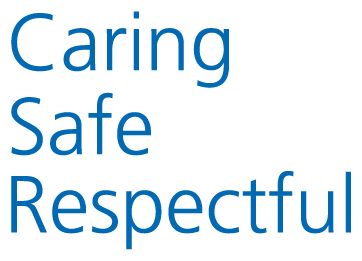Once you are well enough, you will be discharged from hospital – this simply means that the professionals looking after you feel that you no longer need to stay in hospital and will be able to continue your recovery at home or a place of safety whilst awaiting ongoing assessments in the community if required.
Many hospital discharges are straight forward and require little or no change to a person’s lifestyle, home environment and/or care needs. However, some patients may go through significant changes after an accident or period of illness, and may require additional help once they leave hospital.
Discuss your discharge plan with your ward's dedicated Discharge Facilitator or contact the Transfer of Care Hub on 01253 954444.
There is support for patients who are not able to arrange their own transport home.
- What your needs were before admission.
- What your wishes are now.
- The views of your family/carers.
- What is the least restrictive option for you.
- Possible changes to your needs following admission, and the level of recovery we expect you to achieve.
- Your home environment (for example stairs within the property, the location of the bedroom and toilet, and so on).
- Any equipment or home adaptation needs.
- Social care needs.
- Need and eligibility will be considered following the Discharge to Assess ethos for care packages, continued nursing care and/or other services.
- Changes in medications and/or how they are given.
- Transport needs.
- Any vulnerability, including age, frailty, terminal illness, learning disability and mental health problems.
- Infection control issues.
- If you live on your own, ensure arrangements have been made to turn on the heating (if necessary) and stock up on food and drinks.
- Finalise any transport arrangements with relatives, friends or carers.
- Remove all belongings from your hospital bedside table and cabinet, and ensure no valuables are left in the safe.
- Make sure you have any medications or nutritional drinks belonging to you from the ward fridge.
- Have suitable clothing for your discharge – this means weather-appropriate and comfortable clothing.
- Check that you have your house keys or make alternative arrangements.
- If you have a ‘yellow book’, ensure your coagulation time has been checked and that the book has been returned to you before you leave.
- If you are going home with anticoagulant therapy, ensure you are given a sharps box for your needles and syringes.
- If you are on insulin, ensure your dose has been optimised and that your medication prescription has been updated prior to discharge.
- Ensure you have all the equipment and/or dressings you need.
- Ensure you receive your discharge letter and any other relevant paperwork.
- Ask your ward team for any written information leaflets that may help you to manage your recovery at home, and for contact details of any relevant services.
On the day of discharge you will be asked to have breakfast and be ready to leave the ward soon after. The Trust standard is for patients to leave the ward by 11am if possible to help accommodate patients waiting for admission. If you are waiting for blood results, x-ray results or other interventions, your discharge may happen later on in the day. However, it is still important that you are ready to leave in the morning as, where it is safe to do so, you will be transferred from the ward to the Discharge Lounge.
The Discharge Lounge is staffed throughout the day with nurses and Health Care Assistants to look after you during the last few hours of your stay in hospital. The Discharge Lounge also provides a nice environment for you to wait for medications, family, a taxi or (if appropriate) hospital transport.
If you will be continuing to take medications that you have brought with you from home, these will be returned to you just before you leave the ward. In some cases, you will need new medications to take home. These should be prescribed by a Doctor, checked by a Pharmacist and supplied to the ward the day before your discharge date. If this does not happen, please speak to your ward team, as the late arrival of your medicines may delay your discharge.
If you need your medications to be organised in a monitored dosage system (blister pack), the pharmacy department usually need to give notice to your community pharmacist for them to prepare it. It is therefore important that your needs are discussed with the ward staff well in advance of your discharge date to avoid any delay.
On the day of discharge your medications will be discussed with you, and we will explain how they should be taken, as well as any common side effects that you should be aware of. You should make an appointment with your GP as soon as possible after leaving hospital to obtain a further supply of any prescribed medications (if needed). Your GP will also receive an update from the ward giving a brief outline of your admission, any investigations and findings, any further follow up arranged or any interventions required by the GP. If you need additional information about your medications, you can contact your local pharmacist for a medicines check-up and review.



